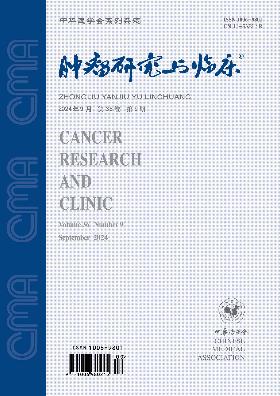盆腔癌放疗后肠道菌群的改变
Q4 Medicine
引用次数: 0
摘要
目的探讨盆腔放疗对肠道菌群的影响,放射性肠炎与肠道菌群之间的关系,以及益生菌干预对肠道菌系和腹泻的影响。方法2018年3月至11月,南京医科大学附属苏州医院共收治22例患者,其中大肠癌5例,癌症15例,子宫内膜癌2例。5例癌症宫颈癌患者接受益生菌口服联合放疗。选择10名健康体检者作为对照组。采集每位患者放疗前后的粪便样本,采用16S rDNA测序技术检测粪便菌群,分析放疗对肠道菌群的影响。结果健康对照组粪便菌群主要成分为厚壁菌门(39.86%)、拟杆菌门(37.77%)、未分类细菌(15.96%)和变形菌门(5.03%),与患者相似,但细菌丰度差异显著。放疗前后患者肠道菌群存在差异。放射治疗后,微生物多样性和丰度发生了变化,尤其是在后来出现严重腹泻的患者中。厚壁菌门/拟杆菌门的比例在放疗后发生改变。严重腹泻患者放疗后,大肠杆菌志贺菌和梭杆菌的丰度增加。口服益生菌可以缓解腹泻,减少微生物多样性和丰度的下降。结论盆腔肿瘤患者放疗后肠道菌群的多样性和丰度下降,尤其是严重腹泻患者。口服益生菌可以缓解腹泻。关键词:盆腔肿瘤;放射性肠炎;16S rDNA;肠道菌群;益生菌本文章由计算机程序翻译,如有差异,请以英文原文为准。
Alteration of intestinal flora after radiotherapy in patients with pelvic cancer
Objective
To investigate the effect of pelvic radiotherapy on intestinal flora, the correlation between radiation enteritis and intestinal flora, and the effect of probiotics intervention on intestinal flora and diarrhea.
Methods
From March to November 2018, a total of 22 patients who were admitted to the Affiliated Suzhou Hospital of Nanjing Medical University were enrolled in the study, including 5 patients with colorectal cancer, 15 patients with cervical cancer and 2 patients with endometrial carcinoma. Five patients with cervical cancer received oral administration of probiotics combined with radiotherapy. Ten healthy physical examiners were selected as the control group. The stool samples were collected from each patient before and after radiotherapy, and 16S rDNA sequencing technology was used to detect the fecal flora and analyze the effect of radiotherapy on intestinal flora.
Results
The main composition of intestinal flora in the stool samples of healthy control group was Firmicutes (39.86%), Bacteroidetes (37.77%), unclassified bacteria (15.96%) and Proteobacteria (5.03%), which was similar to patients, but the abundance of bacteria was significantly different. There were differences in the intestinal flora of patients before and after radiotherapy. Microbial diversity and abundance were altered after radiotherapy, especially in patients who later developed severe diarrhea. The Firmicutes/Bacteroidetes ratio was altered after radiotherapy. The abundance of Escherichia-Shigella and Fusobacterium increased after radiotherapy in patients who developed severe diarrhea. Oral administration of probiotics could alleviate the diarrhea and reduce the decline of microbial diversity and abundance.
Conclusions
In patients with pelvic tumors, the diversity and abundance of intestinal flora decrease after radiotherapy, especially in patients with severe diarrhea. Oral probiotics can alleviate the diarrhea.
Key words:
Pelvic neoplasms; Radiation enteritis; 16S rDNA; Intestinal flora; Probiotics
求助全文
通过发布文献求助,成功后即可免费获取论文全文。
去求助
来源期刊

肿瘤研究与临床
Medicine-Oncology
CiteScore
0.10
自引率
0.00%
发文量
7737
期刊介绍:
"Cancer Research and Clinic" is a series of magazines of the Chinese Medical Association under the supervision of the National Health Commission and sponsored by the Chinese Medical Association.
It mainly reflects scientific research results and academic trends in the field of malignant tumors. The main columns include monographs, guidelines and consensus, standards and norms, treatises, short treatises, survey reports, reviews, clinical pathology (case) discussions, case reports, etc. The readers are middle- and senior-level medical staff engaged in basic research and clinical work on malignant tumors.
 求助内容:
求助内容: 应助结果提醒方式:
应助结果提醒方式:


